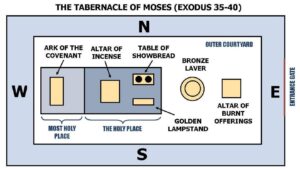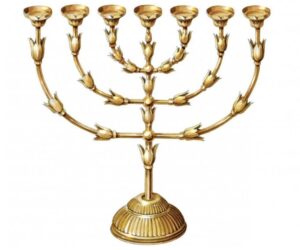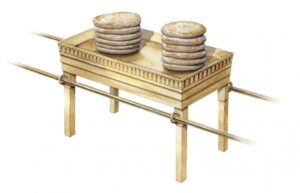Holiness in the Mundane and from the Profane
Leviticus 24:23
Introduction.
How many of you like doing chores?
Some people love doing chores, some hate it, some are rather indifferent.
For the most part, chores are rather mundane and boring, but necessary.
We have to take out the trash, mow the lawn, do the laundry and dishes.
Well, in this chapter, the Lord regulates certain mundane chores in the tabernacle.
This chapter is divided into two parts.

The first part, as mentioned, considers the regular goings on in service to the Lord.
More specifically we see the burning of the lamps in the tabernacle (lampstand) along with the baking of the bread on display (table of showbread).
The second part is unusual in Leviticus—it presents a narrative.
The only other narrative we see in Leviticus is chapters 8-10, where we see the priests carrying out the activities discussed in the first 7 chapters and, at some point, failing miserably with what happened to Nadab and Abihu.
This narrative reveals what was to happen to someone other than a priest who breaks the Law, even one of the Ten Commandments.
We see the holy, yet mundane activities of the priest contrasted sharply with the carrying out of God’s justice.
Preview.
The Mundane (24:1-9).
The Profane (24:10-23).
Body.
Holiness in the Mundane (24:1-9).
Both of these activities are essentially mundane chores, but treated with no less care and deliberateness.
Pure olive oil was to be used which meant it was to be taken from the first press of the olives—the best of the best.
The Israelites were to provide this olive oil for service in the tabernacle.
The priests, namely the high priest, were to keep this lamp burning in the tabernacle continually, or regularly.
There is some debate as to when they were to keep it going, but suffice it to say, it was a regular thing, at least done from evening until morning every day.
The purpose is not stated, but presumably it is to provide light for the priests so they can carry out the essential duties of service to God, even when it is dark out.
While the oil in the lamp was to be a daily task, the showbread was meant to be taken care of weekly.
Just like with the grain offering, this is meant to be unleavened and made of fine flour—the best of the best.
Frankincense, a fragrant oil, was to be put on the bread to serve as a memorial, to remember all the great things the Lord had done for them, including providing for their needs.
Of course the bread would eventually get stale and spoil, so it had to be replaced every week, on the Sabbath.
It was set before the Lord, in the presence of the Lord, which is why it is called showbread—it is shown or displayed in His presence in the tabernacle.
Then the priests were to eat of the old bread in a holy place.
It’s why it was such a big deal that David and his men ate of the showbread in 1 Sam. 21 when they were hungry and in need.
Application.
So what do these things, the lighted lampstand and the fresh showbread mean for us?
Since all the Israelites provided for the raw materials that were used in the service of the Lord, it shows that all Christians also are to work in service to the Lord.
We are all to “let [our] light so shine before men, they they may see [our] good works and glorify your Father in heaven” (Matt. 5:16).
The purpose isn’t to be seen, but to glorify God.
As Jesus is the light of the world (John 8:12), we have our own light, a reflection of the true Source—Jesus Christ.
And it is through the Word of God that this can be accomplished (Psa. 119:105).
Our light ought to point to Jesus, showing people the way to Him. “This little light of mine. I’m gonna let it shine.”
The bread, as we’ve talked about on several occasions, shows the bread of life—Jesus.
He is the light of the world, but He is also the “living bread which came down from heaven” (John 6:51) – this is a bread that never spoils or goes bad!
He was in the presence of the Lord, and still is, having come down from heaven (John 1:1, 14).
Jesus continues: “If anyone eats this bread, he will live forever; and the bread that I shall give is My flesh, which I shall give for the life of the world.”
I tend to look at that in two ways: the first is obvious. His flesh was given that we might have life eternal, and we remember that in the Lord’s Supper.
The second is that, based on the context, Jesus is shown to have the words of eternal life (John 6:68).
Both His light and His bread point to His Word which points to Him, Christ Jesus.
But then, as if to show a strong contrast with the holiness in the mundane, we see something profane.
Holiness from the Profane (24:10-23).
Person (24:10a, 11b) – who is involved here?
We see a presumably young man who was traveling with the Israelites.
He was mixed, as his father was an Egyptian, but his mother an Israelite herself.
We note his mother’s name, Shelomith daughter of Dibri—a Danite.
Another notable Danite was Samson, so there is potential for greatness here!
He had every right to be there, just as we know several Egyptians traveled with the Israelites in their exodus, perhaps even this boy’s father.
Deed (24:10b-11a, 12) – what did he do?
The young man got into a scuffle with an Israelite.
I could see how this played out…
Perhaps the young man was teased or provoked because of his parentage and the other in the fight said, “We are the chosen people of the Lord, not you!”
Or maybe it was a completely unrelated matter.
But it would explain why he felt it necessary to blaspheme and curse His holy name.
Recall the third commandment: Do not take the name of the Lord your God in vain—a commandment he violated.
Let us consider the rest of the verse: “You shall not take the name of the Lord your God in vain, for the Lord will not hold him guiltless who takes His name in vain” (Exo. 20:7).
We know that name to be represented by four Hebrew letters: YHWH, or Yahweh. Some pronounce it Jehovah.
As one commentator put it: “In Israel a name represents the whole person and thus becomes a powerful force, as powerful as the person named. A name could be blotted out, redeemed, praised, prayed to, preserved for an inheritance, made famous, win battles, or dwell among individuals” (Ross 446).
We use that in a similar way when we say we’ve done something “in the name of God,” an indication that we have done so by His authority.
We also use it when we say, “They dragged his name through the mud” – referring to sullying one’s reputation.
The commentator continues: “The ‘name of the Lord’ is clearly a force to be reckoned with in the Old Testament because it represents the divine nature, all that God is known to be” (Ross 446).
To curse something like that is serious business so the people detained the young man until they were told what to do with him.
Judgment (24:13-23) – what was to become of him?
In Lev. 10 we saw the untimely deaths of two profane priests by the hand of God.
This time we see the untimely death of one profane man by the hands of the people.
It was the responsibility of the people to carry out God’s justice upon those who were not priests.
The ones who heard the blasphemous utterances were to place their hands on the guilty person’s head.
This was to indicate that the hearers were not complicit in the blasphemy.
Stoning was a severe punishment for a severe sin against God.
This sin showed a complete lack of respect and disregard of God and His Law.
If such an action were to go unpunished, it would encourage others to disregard the Lord and His commands—he would not be held guiltless.
Then we see other judgments given for various sins and crimes—“eye for an eye, tooth for a tooth” stuff.
What God is trying to relate is a proportional punishment.
Many believed that the punishment should be greater than the crime, a kind of escalation that would only end in disaster.
Both the Law of Moses and the Code of Hammurabi regulated this proportional punishment, and is a cornerstone to modern law.
Whatever the case, the people carried out the man’s punishment, clearly seeing this as proportional to his sin.
They practices holiness from purging the profane.
Application.
We should always be careful what we say.
Freedom of speech is a cherished value in our country, as it should be.
But that doesn’t mean we will be okay with God no matter what we say.
“God’s people must sanctify the name of the Lord (e.g. ensure that the Lord’s holy and sovereign character is preserved in the world)” (Ross 448).
Some obviously take this too far, thinking that Jesus must called Yeshua and God should always be referred to as Yahweh or Jehovah.
While God’s name is of the utmost importance, the particular moniker is not so much.
The point, of course, is that when one blasphemes the name of the Lord, he is really speaking evil of the Lord, all that He is, all that He has done for us.
Recall the “unpardonable sin” in Mark 3 – blasphemy of the Holy Spirit.
If you remember in that discussion, Jesus informs us that, “all sins will be forgiven men, and whatever blasphemies they utter; but he who blasphemes against the Holy Spirit never has forgiveness, but is subject to eternal condemnation” (Mark 3:28-29).
We found that this sin was very particular to that time, applying only to those who were witness to the miracles of Jesus.
But for us, if we reject the witness of the Holy Spirit found in the Scriptures, we are rejecting God’s Word, the very thing the light and the bread point us to.
When that happens, there is no hope for our souls.
That is when we truly reject the name of the Lord, that is true blasphemy, a true curse upon the God who loved us so much.
We have no edict to enforce this on others, but we should do all we can to praise and honor our Lord and God.
Conclusion.
When we consider the Light of the World and the Bread of Life, we consider Jesus.
We consider all that He’s done for us, the light and life that He brings.
That truth is illuminated through Scripture and shines through each of us, if we’ll let it.
It is the Bread of Heaven, through His Word, that gives us this eternal life.
And it is something we are to proclaim so others might receive this life, too.
No man can come to the Father except through this Light and this Bread.
Let us do our part to share the gospel to others.
If we curse and blaspheme that name, we are disparaging the gospel.
People will not want to obey that sweet gospel of Christ if we speak against it.
We can speak against the church, against God, Christ, or whatever else, but if we do, we will have no part of heaven.
We can be forgiven if we repent, but if we disregard His Word, we cannot repent (Heb. 10:26-31).
It is a fearful thing, and we should never take it lightly.
If you want to escape such a fate, follow His light and eat His bread.
You can do that by …


